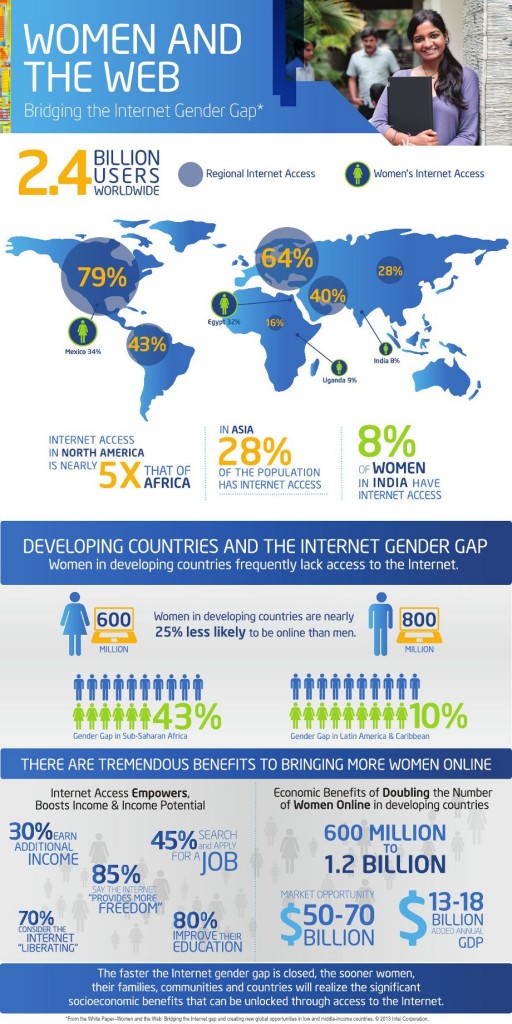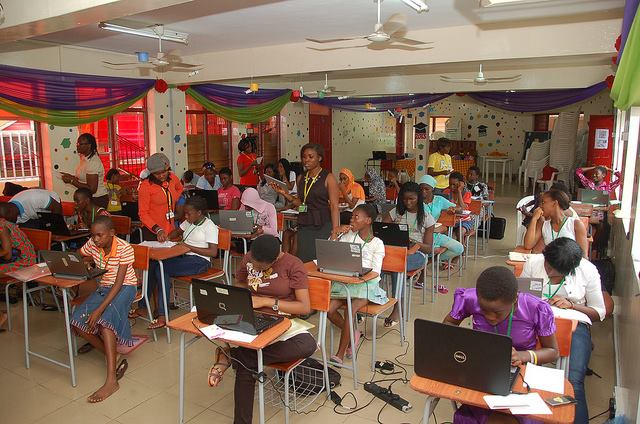Leaving a cushy job at an oil and gas firm to start a non-profit isn’t the sexiest career move anyone can make.
Seven years later, few people in Nigeria, if any, can speak with more authority on the subject of getting girls and women into technology than Ore Somolu. To date, over 5,000 women and girls have passed through the Women’s Technology Empowerment Centre (W-TEC) that she founded in 2008.
The gender gap is one of global technology’s hot button topics. However, while first world discussion of the issue often centers around the paucity of Marissa Mayers and Sheryl Sandbergs in blue chip tech boardrooms, developing countries have even more fundamental concerns. An Intel commissioned study on “Women and the Web” in consultation with the U.S. State Department’s Office of Global Women’s Issues, UN Women, and World Pulse examined women’s access to and use of the Internet in low and middle income countries. The resulting report showed that, on average, nearly 25% fewer women than men are online in developing countries, and that in sub-saharan Africa the gap is closer to 45 percent.
Against this backdrop, women like Ore are outliers, lucky to have been exposed early on to technology. Her father was an engineer. In 1982, Ore’s dad brought his children a Commodore 64. In 1993, he came home with a PC that had Windows 3.1 installed.
“I enjoyed having a computer at home on which to practice these new skills in different areas. So much so that even while I studied Economics at the University, I set-up a business typing and printing essays for fellow students. Making money from a seemingly simple skill was surprising, so it was probably around that time that I began to think about an ICT-related career.”
After university, Ore signed up for a 6 month diploma during which she learnt enough Basic, COBOL and Lotus 123 to build an application that solved the inventory problem’s with her parents’ bookstore.
Stereotypes are the first precipitating factor that comes up for discussion on the subject of why there are aren’t more women in tech. And rightly so. Gender role stereotypes and society’s perceptions about the kinds of life choices women should make are as old as humanity itself. Funke Opeke, CEO of Main One and one of the most visible poster women of achievement in Nigerian technology graduated from the Obafemi Awolowo University in 1981 with a degree in electrical engineering. She was the only woman in her class.
However, the people and organisations that care about bridging the digital gender divide are beginning to find that access is as much of a problem as stereotypes. Intel, for instance, hopes to reach 5 million girls and women in Africa and emerging economies over the next few years, and reduce the yawning gender gap by 50 percent, via its She Will Connect digital literacy programme.
It was in the course of obtaining a masters degree in Information Systems that Ore would become acquainted with the impact of information technology on economic growth and development. The seed that would eventually grow into W.TEC was planted via Ore’s focus on the under-representation of African women in technology for her final dissertation.
She resolved to do something about it. In the beginning, her ambitions were modest.
“I conceived of a place where women could learn basic technology skills – like how to use a computer for creating and editing documents.”
These days however, W.TEC’s curriculum has expanded from basic computer appreciation and desktop publishing to more advanced and applied uses of technology. The trainees now learn how to work with computer hardware, programming, and web development.
“It’s basically our way of introducing the girls to the different career paths they could pursue.”
With a ton of activities lined up for the rest of the year, Ore’s hands are full. Their next event, the Girls’ technology camp comes up next month. The sheer breadth of their programmes requires W.TEC to rely on partnerships with individuals and corporates to achieve its objectives. Last year, General Electric staff were personally on hand to teach the girls how to use Scratch to build basic apps.
The last question I asked Ore during our interaction was what she would do if there were no limits, financial or otherwise.
“Most of the schools we work with don’t have computer labs or teachers. We would like to provide these resources so that the benefits of digital literacy can also reach those who are not directly enrolled in our programmes. Not having to worry about resources would also free us up to be more ambitious and tackle harder problems, and stay with the girls throughout the critical paths of their budding technology careers.”





















